Imagine you are a leader who wants to transform a culture. How can you get some early wins on the road to delivering success? One approach is to learn from individuals who make changes in their lives.
A person can spend years thinking about making a philosophical change. They may want to feel healthier, be happier, find a more satisfying job or whatever.
The first step to making the change happen, however, often begins on a physical level. They start running, do things that give them positive energy or create a project where they do satisfying work.
The person actually does something that brings success, rather than just thinks about doing it. They find that the physical change leads to psychological change.
They feel better and see positive results. This reinforces the belief in making the philosophical change.
Let’s explore how you can follow similar steps to transform a culture.
Changing The
Physical Things
Physical changes set the tone. But these must be followed by deeper changes if you are serious about transforming a culture.
People buy success, rather than the theory of success. So it can be useful to begin by producing some tangible wins. You can then follow up by finding and publicising other success stories.
Start by making physical changes for the employees, beginning with the hygiene factors. Pay the market rate, improve the building and give them the tools to do the job.
“Several years ago I took over a company that was in the dark ages,” said one leader.
“We modernised the entrance, gave the receptionists smart uniforms, displayed our products in the reception area, put in proper coffee areas, installed Wifi and gutted the office.
“Previously it had been open plan, full of old style chicken run desks, with little privacy. Stress and sickness were at an all time high.
“Redesigning the office, we got the balance between public and private spaces. People could talk to others and yet also find more secluded spaces to do creative work.
“The Atrium areas were constantly occupied by people working or having informal meetings. People were also encouraged to work from home on Fridays.
“Customers now use our offices for their meetings. Productivity has improved and the changes paid for themselves within a year.”
Imagine you are a leader and want to shift a culture. Actions speak louder than words. People believe what they see, not what they hear.
Bearing this in mind, how can you change some of the physical things to demonstrate that change is happening? When doing this, it can be useful:
To show the direction in which the culture is heading by making physical changes that embody the qualities required in the future culture.
To show what good looks like and demonstrate high quality in the physical changes.
To show people that the organisation will make physical changes that will support them in their work and enable them to achieve success.
If you wish, try tackling the exercise on this theme. This invites you to do the following things.
Describe the specific things you can do to get some quick successes by changing some of the physical things.
Describe the specific benefits of making these physical changes.
Changing The
Psychological Things
How can you encourage people to develop a winning feeling? One approach is to use Appreciative Inquiry to produce success stories.
AI focuses on what works. It invites people:
To clarify when they have performed brilliantly.
To clarify the principles they followed to perform brilliantly.
To clarify how they can follow these principles – plus maybe add other elements – to perform brilliantly in the future.
You can discover more about the Appreciative Inquiry approach via the following link.
http://www.thepositiveapproach.info/the-appreciative-inquiry-approach/
My own work over the past 40 years has been based on The Positive Approach. This invites people:
To clarify their picture of success.
To clarify the strategies they can follow to achieve their picture of success.
To do what is necessary to achieve the picture of success.
When working with organisations, I have found it useful to help people to identify that they already have the seeds of growth within themselves. This often involves using elements of Appreciative Inquiry to produce success stories.
Imagine you want to help people to focus on the key principles they can follow to achieve success in the future. You may wish to go through the following steps.
Start by appointing somebody who is responsible for collecting and publicising the success stories.
It is vital to have a mission holder who will make this happen. They do not have to write the stories – they can hire somebody to do that – but they must make sure the stories and published.
You can then take the following steps.
You can run sessions where people share the specific times that they – or others in the organisation – have done superb work. They may have helped customers to succeed or done work inside the organisation that has delivered success.
You can invite them to clarify the specific things that people did – including the principles they followed – to achieve success.
You can invite people to focus on how they can follow some of these principles – plus maybe add other skills – to do their best to achieve success in the future.
You can invite people to focus on the specific success stories they believe it is possible to deliver in the future. Invite them:
To clarify the specific customers who they can work with to achieve particular goals and produce success stories.
To clarify the dates by which they want to deliver the written success stories.
There are many ways to write such stories. Here is one approach.
There are many ways to create an encouraging environment. Your role is to be a good model, build on the positive people and give everybody the chance to opt into achieving the goals.
You can only do your best, of course, and some people may still choose to be miserable. That is their choice and there may be consequences.
If you wish, try tacking the following exercise. This invites you to do the following things.
Describe the specific things you can do to change some of the psychological things.
Describe the specific benefits of doing these things.
Changing The
Philosophical Things
Good leaders encourage people to channel their energies towards achieving a compelling goal. They also, in the process, sometimes show people a particular philosophy of living or working.
They bring the philosophy to life by showing how it has been translated into action and delivered positive results.
They do this by moving from the concepts to giving concrete examples. This reinforces the fact that the philosophy has worked – or can work – and delivers success.
There are many ways to make this happen. Here are some of the methods used by leaders.
They describe the organisation’s purpose, principles and picture of success.
They describe the positive benefits – to the various stakeholders – of achieving the goals.
They describe how people have – or can – follow the key principles to achieve positive results.
They describe the support the organisation will give people in working towards achieving the goals.
They describe people’s roles – plus the positive spirit and professional standards they will need to demonstrate – in working towards achieving the goals.
They invite people to take time to reflect and decide if they want to contribute. They invite the people who want to contribute to make clear contracts about their best contributions towards achieving the goals.
They reward the behaviour they want repeated. They encourage the people who are positive and who deliver the required professional standards.
They keep showing what good looks like and publicising success stories.
They manage by outcomes – rather than by tasks – and enable people to perform superb work.
They do whatever is necessary to ensure the organisation achieves its picture of success.
Good leaders often remind people why they are succeeding. People are doing something physically different.
They have changed the physical things to change the psychological things to change the philosophical things. People can continue to translate the philosophy into action to achieve ongoing success.
You will have your own way of focusing on the philosophical shift. If you wish, try tacking the following exercise. This invites you to do the following things.
Describe the specific things you can do to change the philosophical things.
Describe the specific benefits of changing the philosophical things.


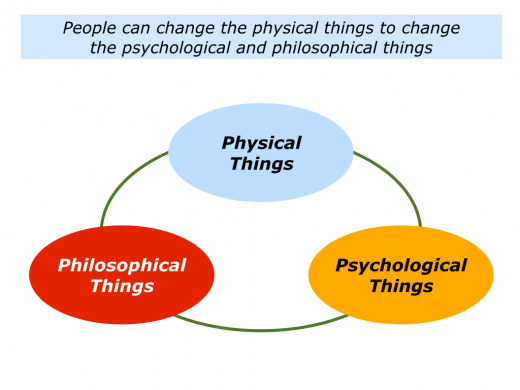

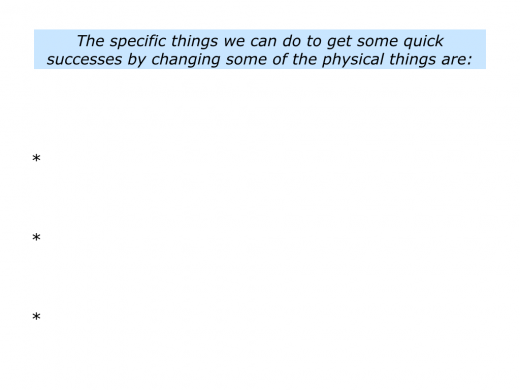


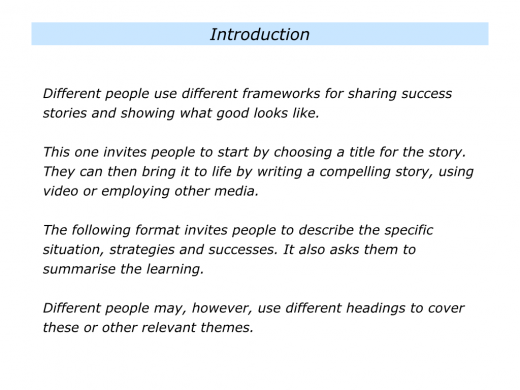
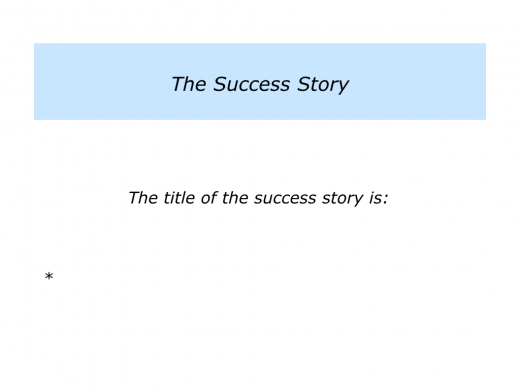
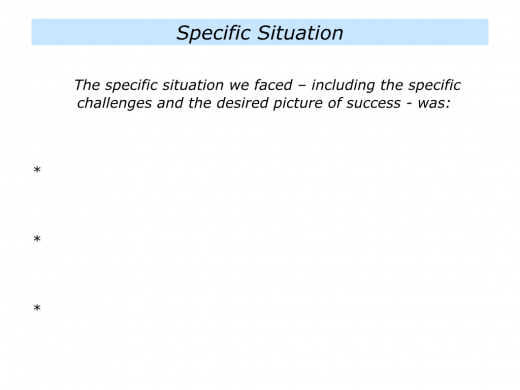
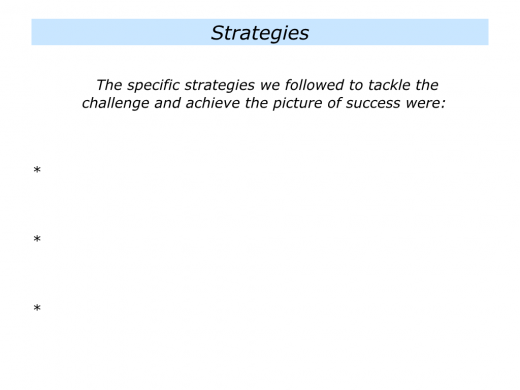
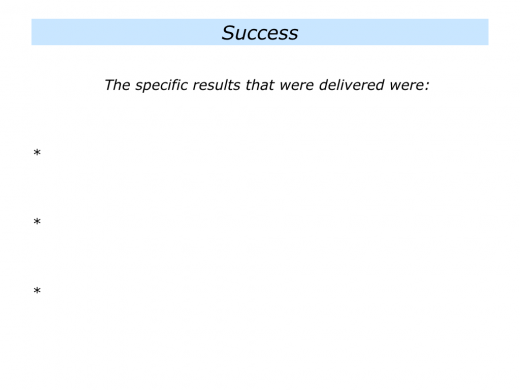
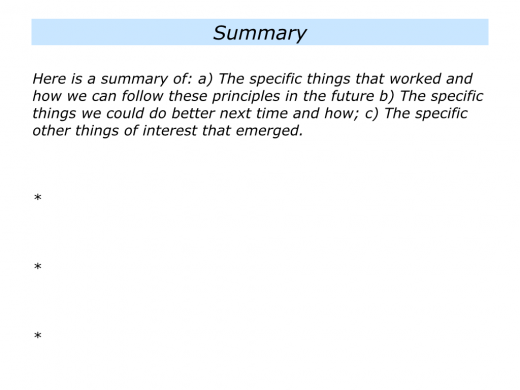

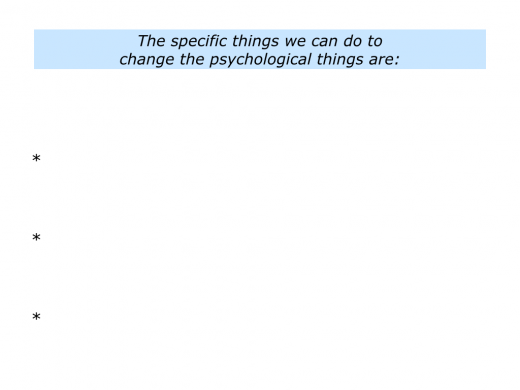


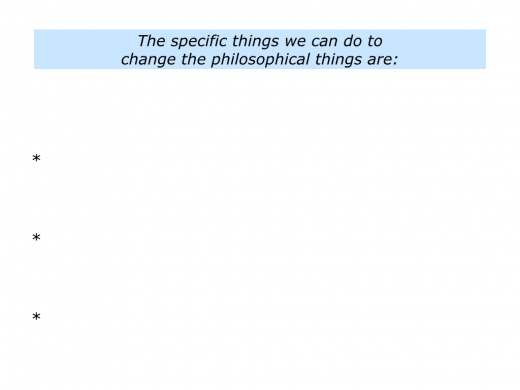





Leave a Reply